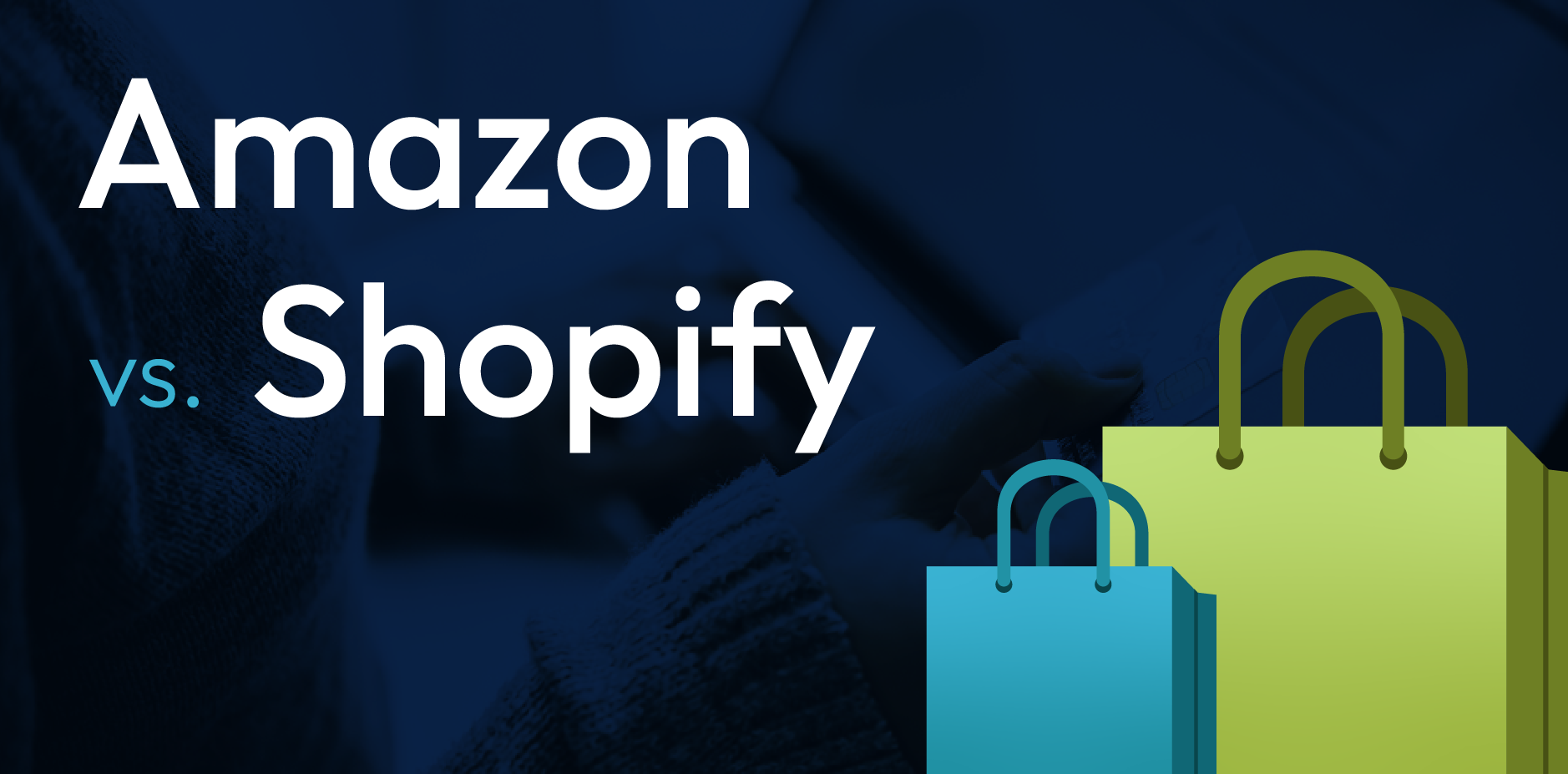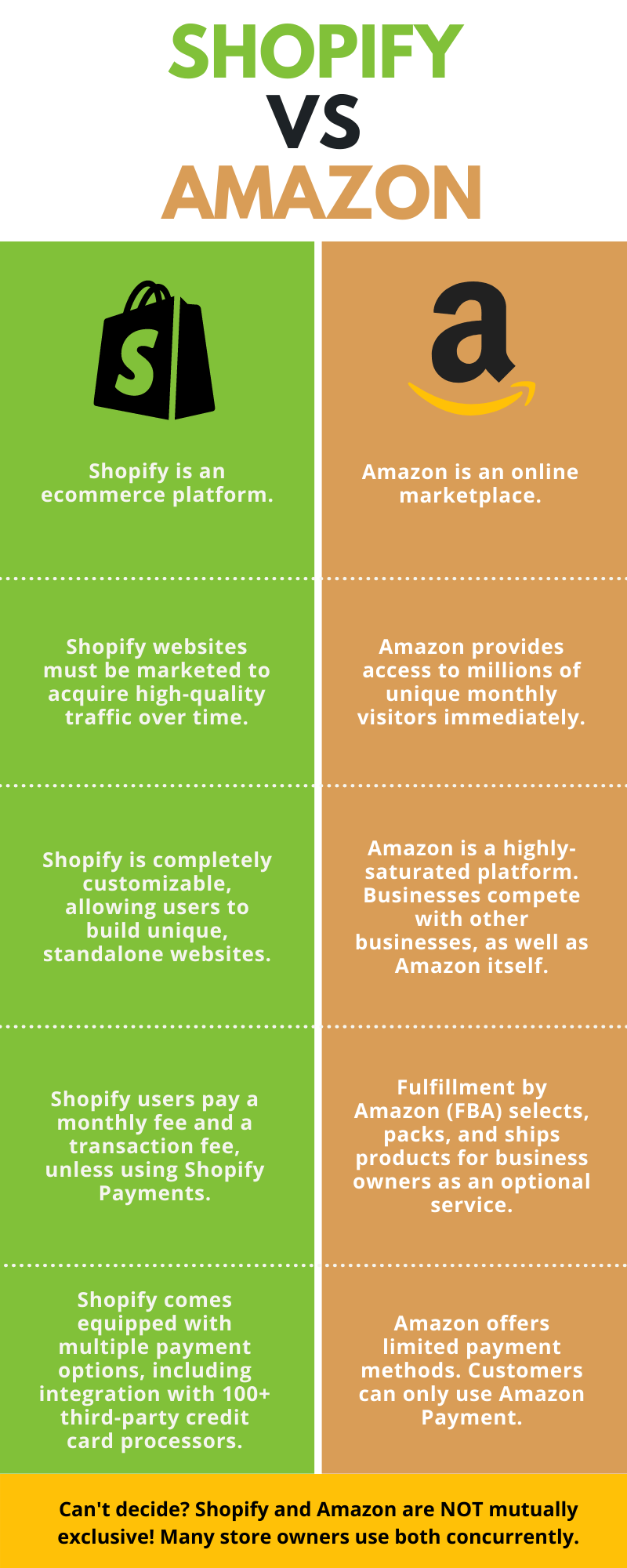Amazon vs Shopify: What's the Difference?

Whether you’re just getting started with online selling or are looking to re-platform, choosing where to sell your products online is a significant decision for any business owner.
In the search for the perfect online selling platform, Shopify and Amazon are a few of the major players. However, argument over which is best can make it difficult to choose.
In the following content, we explore the pros and cons of both platforms, adding a helpful voice to the Shopify vs. Amazon debate. We also dig into the benefits of using both simultaneously.
What's the Difference Between Shopify and Amazon?
Businesses can use Shopify and Amazon to sell their products online. However, they are not technically the same type of platform.
Shopify is an ecommerce platform. Amazon is an online marketplace.
In other words, Shopify allows business owners to build a singular, stand-alone online store, while Amazon provides a marketplace page to sell products among hundreds of other companies.

Shopify: The Pros
1. Streamlined website creation
The Shopify platform is designed to easily build independent ecommerce sites. Shopify provides templates to prompt website development in a user-friendly interface; alternatively, businesses can hire a Shopify web development partner for custom design and functionality needs.
Additionally, all themes purchased from Shopify’s Theme Store are responsive, meaning they look good on mobile and desktop devices.
2. Access to ecommerce tools
Shopify provides a multitude of built-in ecommerce tools, such as an invoice generator, abandon cart recovery tool, and automatic tax calculation.
If you require another tool that is not organically provided, Shopify’s extensive app store provides access to pre-built apps that can infuse unique, intriguing functionality into your website. Apps can be selected for B2C or B2B businesses, including discount coupon apps, wholesale and net payment apps, etc.
If needed, a Shopify developer can craft and integrate custom functionality as well.
3. Multiple payment options
PayPal, Amazon Pay, and Shopify Payments are a few of the many payment gateways Shopify offers. Shopify also integrates with over 100 third-party credit card processors.
Shopify Payments is PCI compliant and supports 3D secure checkouts.
4. All-in-one commerce platform
Shopify integrates with a variety of ERPs and other software, making it an all-in-one commerce platform.
For example, business owners can sync their Shopify data with QuickBooks. Among other benefits, Shopify allows QuickBooks users to:
- Automatically import sales, order details, and inventory into QuickBooks
- View a summary of orders and value, as well as a breakdown of products and their profit margins
- Automatically record fees and payouts
- See imported orders with accurate sales tax data
5. Holistic Point-of-Sale (POS) system
Shopify’s brick-and-mortar POS system is one of the only on the market. Shopify’s POS system replaces the cash register in your physical storefront and integrates with your website.
According to Shopify, the POS systems allows business owners to:
- Generate purchase orders and transfer stock based on inventory forecasts and performance
- Adapt to growing trends in your business with unified analytics that blend in-store and online sales
- Provide the tools to manage your business, market to customers, and sell everywhere in one place
- Delegate with peace of mind and motivate staff to grow with increased responsibilities
6. Complete customization
The only limitation to Shopify customization is the experience of your Shopify development partner, if you choose to hire one.
Shopify partners can build anything a client requires through custom theme development; however, with a bit of refinement, prebuilt themes are often adequate to accommodate almost any digital storefront need.
Shopify: The Cons
1. Multiple fees
Using Shopify involves a few incurred costs. First, you will pay a monthly fee for your Shopify website.
You can select from four pricing plans:
- Basic Shopify: $29/month
- Shopify: $79/month
- Advanced Shopify: $299/month
- Shopify Plus: $2,000/month
Each involve varying levels of functionality. For example, the Basic Shopify plan does not include reporting or give you the ability to integrate with third-party shipping carriers.
Additionally, if you use third-party apps from Shopify’s app store or select a premium design that does not come with your pricing plan, you will pay additional fees. These fees are typically based on how much you will be using the app or the size of your website’s product catalog.
Also, if you do not use Shopify Payments, sales incur a transaction fee at every plan level. These additional fees are 2%, 1%, or 0.5% for the Basic Shopify, Shopify, and Advanced Shopify plans, respectively.
Third-party credit card processors incur a more aggressive fee than Shopify Payments.
2. Marketing
With Shopify, or any other website builder, growing an audience and developing a trusted reputation takes time. Visitors will not come overnight, and you will not be able to piggyback off an existing reputation, like Amazon.
Promoting your products, asking for reviews, delivering excellent customer service, and investing in digital marketing channels require time and hard work.
Amazon: The Pros
1. Instant traffic
Amazon receives over 213 million unique U.S. visitors monthly. As soon as your marketplace page is launched, you have exposure to this traffic. Your products can be placed in front of interested consumers immediately.
2. Product handling & customer service
Fulfillment by Amazon (FBA) allows Amazon to handle your products for you, sent from one of Amazon’s fulfillment centers. An Amazon employee selects, packs, and ships the product. If a customer service issue arises, Amazon takes care of it.
3. Quick setup
Creating an Amazon storefront is quick and easy. Business owners create an account, select from a few pre-made storefront templates, and list their products.
4. Immediate credibility
Customers are hesitant to purchase from a business they don’t trust. Credibility is usually won over time through outstanding products, differentiated branding, and great customer service. Amazon storefronts benefit from Amazon’s reputation.
Customers may automatically feel comfortable purchasing from your storefront, even if you are a new businesses, because they have confidence in Amazon.
Amazon: The Cons
1. Highly-saturated markets
Because Amazon is such an attractive online marketplace, hundreds of thousands of other businesses use the platform! Thus, you are competing with many other businesses for customers – including Amazon itself.
Businesses looking to outperform their competitors must pursue intensive Amazon search engine optimization (SEO).
2. Multiple fees
To sell on Amazon, businesses incur a few fees. First, you must choose one of two plans before selling your items.
- Individual Plan ($0.99 per sold item): if you sell fewer than 40 items per month, you can choose this plan.
- Professional Plan ($39.99/month): if you sell more than 40 items per month, you can choose this plan. The Professional plan also includes more advanced tools.
Additionally, you must pay a referral fee per item sold. Referral fees are outlined by Amazon and differ by product. Finally, if you choose to use FBA, you will incur additional fees, generally calculated by item weight.
3. Impersonal platform
As mentioned, Amazon is not an ecommerce platform, it is an online marketplace. Thus, it does not provide the independence, personalization, or design control that a website does.
The only way a visitor can find your store is through Amazon, which is a hesitancy for many businesses who want autonomy.
4. Limited payment gateways
Amazon does not offer the variety of payment methods that Shopify does. In fact, customers can only use Amazon Payment. Third-party payment platforms are not compatible.
5. Limited control
Businesses must comply with Amazon’s selling guidelines, which can be stifling for a growing company. Additionally, your business is subject to reviews from buyers left on your products, the competitive space, and pricing fluctuations. Ultimately, businesses do not have full ownership over their Amazon online store.
Which Platform Is Best?
As we explored, Shopify and Amazon have pros and cons. Ultimately, the best platform for your online store depends on your goals and needs.
Amazon is fast and easy, but the fees can add up. Shopify’s plans are affordable and predictable, but website development and marketing take time. Are you drawn to a hands-off approach to shipping, provided by Amazon, or flexibility and autonomy offered by Shopify?
For some businesses, the best option is… both.
Do You Have to Pick Either Amazon OR Shopify? NO.
You can utilize Shopify and Amazon concurrently.
In fact, an Amazon marketplace page can streamline the Shopify website building process. For example, product lists can be easily migrated to your Shopify site. You can even integrate Amazon with Shopify.
Laura Douglas, an ecommerce and Amazon specialist, wrote:
Shopify and Amazon are both great platforms for e-commerce, and they’re not mutually exclusive. For companies selling products, Amazon is nearly essential due to the volume of traffic that it offers. Shopify is a great complement to Amazon; there are even apps within Shopify to directly link the inventory of the two. For instance, if you use Fulfillment by Amazon, you can use your Amazon inventory to fulfill orders from both Amazon and Shopify (this is called Amazon MultiChannel Fulfillment).
Plus, Shopify provides a valid web presence, which boosts the trust of Amazon shoppers who are searching for your site. Lastly, there are limitations within Amazon as to how much information you can provide about your product and brand. On the other hand, Shopify allows you to fully display your product information, and your store will certainly help with branding.
RivalMind: Custom Shopify Development
At RivalMind, we work with ecommerce businesses in a multitude of industries, many with Shopify stores and Amazon marketplace pages. As Shopify development partners, we interact with all code-level processes to develop custom, integrated apps to create fully customizable websites.
If you’re interested in the steps to build a Shopify website, reach out to our team! We look forward to getting in touch. Give us a call at (331) 228-9396 or complete our online contact form.

Meet the Author
Harley Helmer
Director of Search Marketing
Harley Helmer is a digital marketing professional with nearly a decade of experience in the industry. Today, he's the head of search marketing strategy at RivalMind, responsible for developing and executing comprehensive SEO campaigns that improve online visibility and boost organic traffic. His pragmatic, no-nonsense approach to marketing – paired with a robust knowledge base – helps him deliver innovative solutions to technical challenges and deliver real client success.
Specialties: SEO Strategy, Google Ads, and Search Marketing Opinions
Looking for more organic website traffic?
Welcome to RivalMind. Our purpose is to help your business thrive. We are a digital marketing agency that offers SEO, PPC, Web Design, Social Media and Video Solutions as tools to our clients for online business development and growth.
Contact us today to get started!
Blog Contact Form
Connect with Us:




